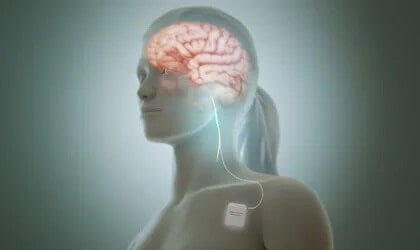Recent studies have shown that vagus nerve stimulation reduces symptoms of resistant depression. Improvement is significant in patients who do not respond to routine treatments. When psychotherapy and medications are not effective, this technique based on electrical stimulation has changed the lives of patients. these patients.
Anyone who knows how the world of psychology and psychiatry evolves knows that new times are coming. Voices like those of Jim Van Os, psychiatrist and editor-in-chief of the famous scientific journal Plos One, inform us of one fact: the treatment of a mental disorder is not limited to focusing solely on symptoms.
- So far we have focused too much on the use of labels and terminology dictated by the DSM-V (Diagnostic and Statistical Manual of Mental Disorders) However.
- A person is much more than a diagnosis.
- Infinitely more than a bipolar disorder or schizophrenia.
Authors like Van Os himself propose mainly to customize treatments, an attitude that is undoubtedly fundamental for people who, for example, suffer from major depression and have not found a strategy that improves them.
In these situations, it is necessary to explore more options so that the specialist professional and the patient find the answer that best corresponds to the particularities of the case.
In recent years, an innovative strategy has already been available: vagus nerve stimulation.
The vagus nerve is one of the most important cranial nerves. It is the number X pair of skulls and, in turn, the most common neural effector of the parasympathetic nervous system.
The vagus nerve is one of the most important cranial pairs, is the longest of them, is distributed below the level of the head and is part of the parasympathetic nervous system, in addition, this neural structure is distinguished by its multiple functions, including sending and receiving information from almost all of our organs.
Its main task is, therefore, to regulate and know the state of the sensory universe of our organism, in this sense regulates the heart rate, controls the correct functioning of digestion and induces relaxation after physical exertion, you could say that it is a mentor, exceptional in its value, always attentive to our well-being.
Until not long ago, experts were aware of its relationship to anxiety and stress, but in 2006, a study published in the journal Biological Psychiatry revealed something even more interesting: vagus nerve stimulation has opened up a new therapeutic method for the treatment of resistant depression.
Charles Conway, a psychiatrist at the University of Washington, was aware of the need for new strategies to treat resistant depression. We often encounter patients who take up to 3 or 4 antidepressants a day without feeling any improvement, so the goal was clear: to give them a better quality of life.
At the University of Washington School of Medicine, this method has been tested for several years, so far 328 patients have been treated, the results of which have been very successful.
Vagus nerve stimulation is achieved by neuromodulation, so there is an electrical stimulation to reactivate the function of this nerve.
For effective treatment, small devices implanted (using outpatient surgery) under the chest skin on the left side have been designed in recent years. As soon as they start working, they start sending electrical signals through the vagus nerve until they reach the brain.
Mood improvement appears in a few days
Before finishing, there is still an important aspect to be analyzed, vagus nerve stimulation is not an exclusive or definitive therapeutic strategy to end depression, it is a mechanism that improves the quality of life and, more importantly, makes the rest of treatments (such as psychotherapy) effective.
It’s like waking up. This precise and controlled electrical stimulation allows the person to feel better, more receptive, so that the patient can refocus, take an interest in a film, a book or walk, ultimately improves mood and activates motivation. to bring about change.
It is at this stage that psychological therapy can be more effective than ever. That is when it is possible to provide the person with appropriate strategies to face their own reality.
In addition, there is another detail that we need to take into account, it is estimated that between 30 and 40% of people with major depression can be resistant to treatment, in cases where we have an almost catatonic patient, vagus nerve stimulation is a problem. very effective strategy.
We will therefore be attentive to further progress in this area.

